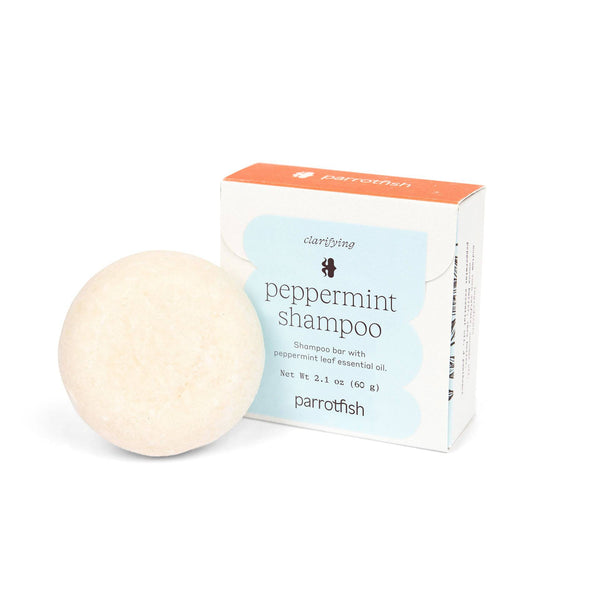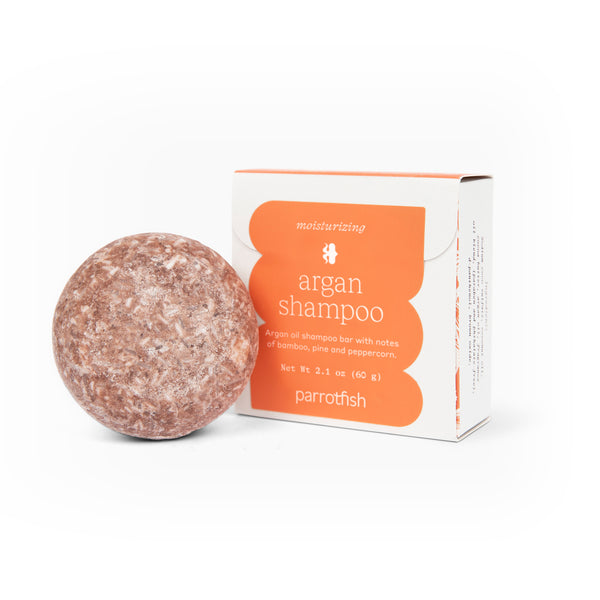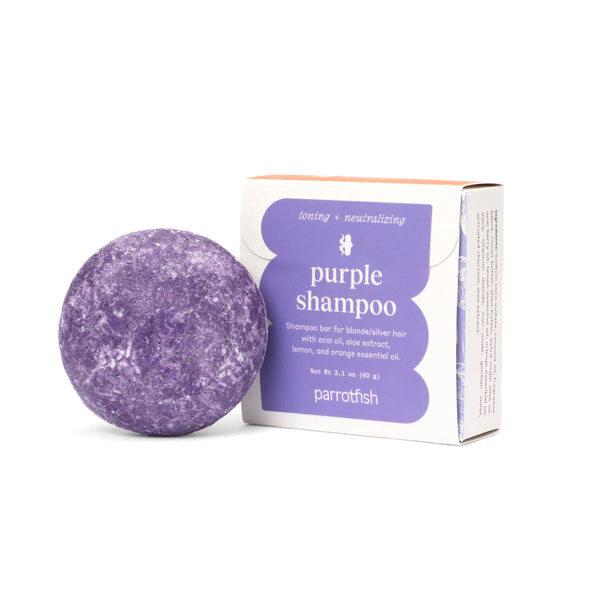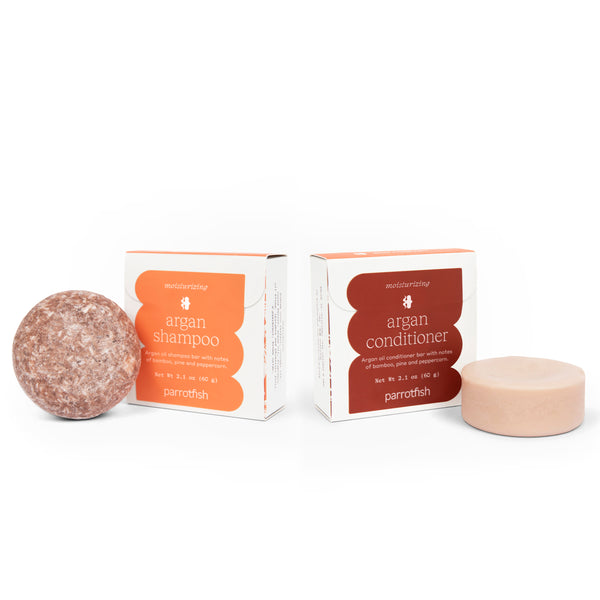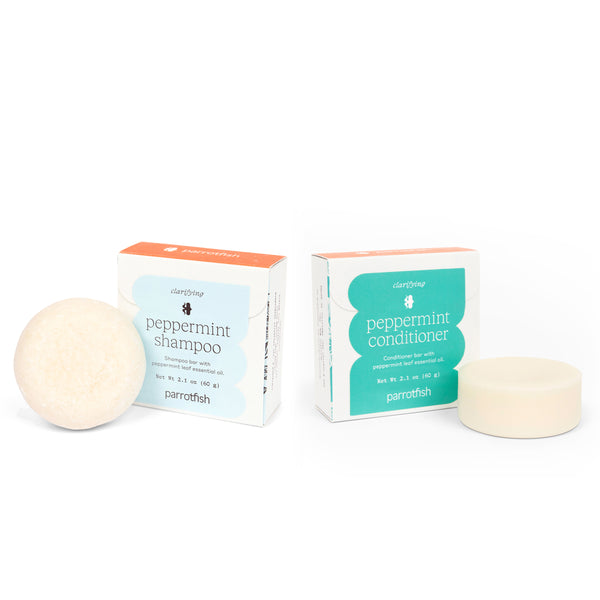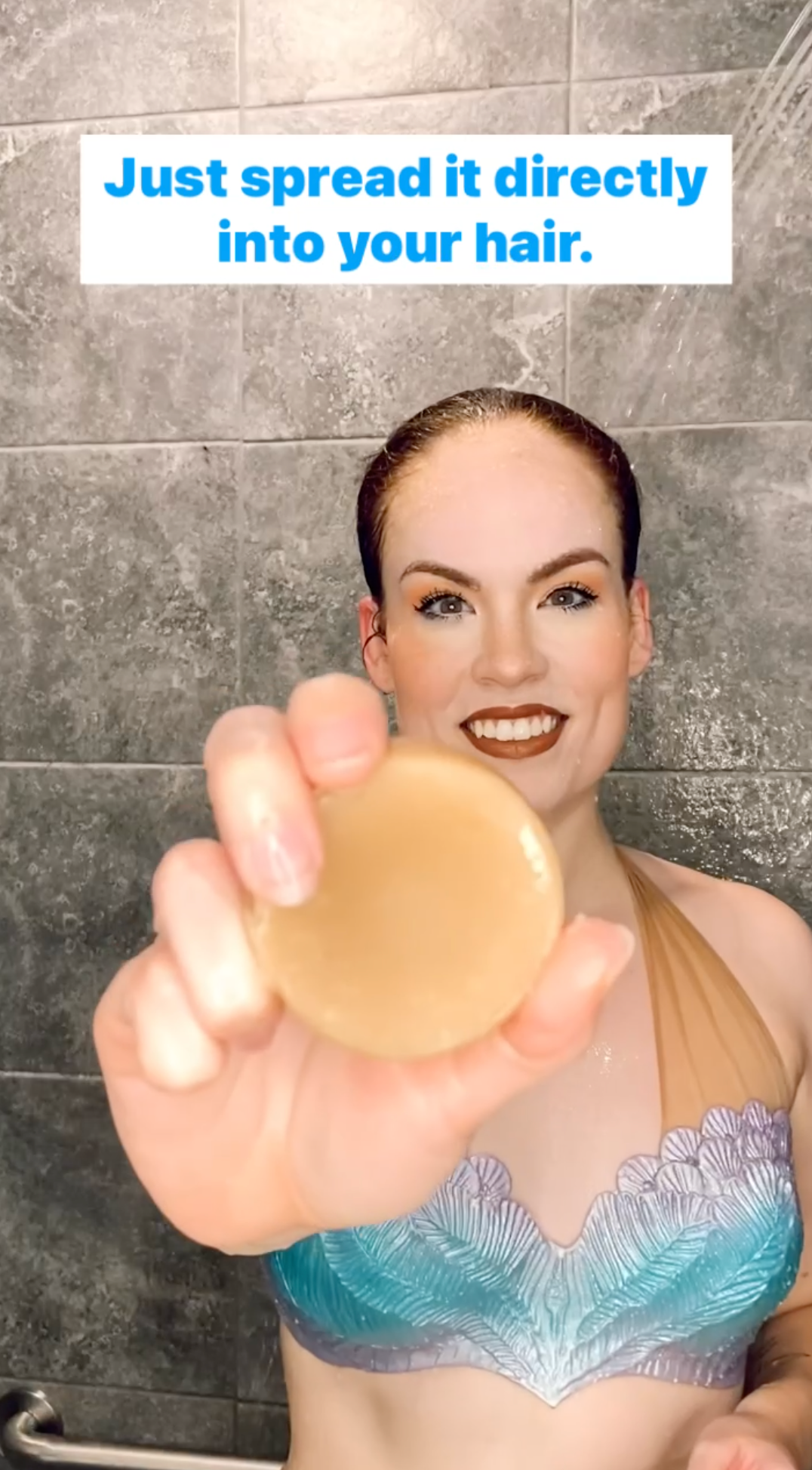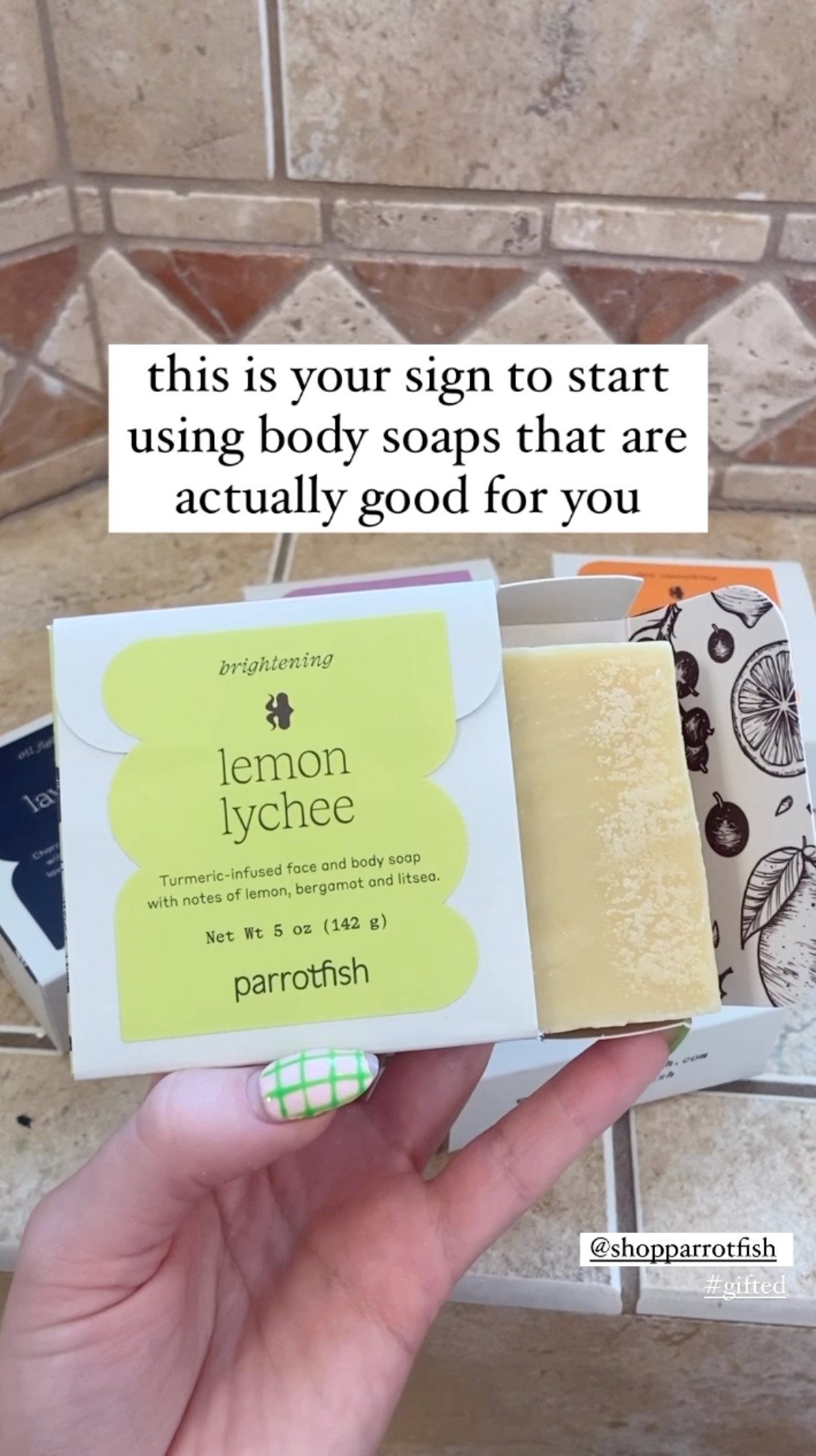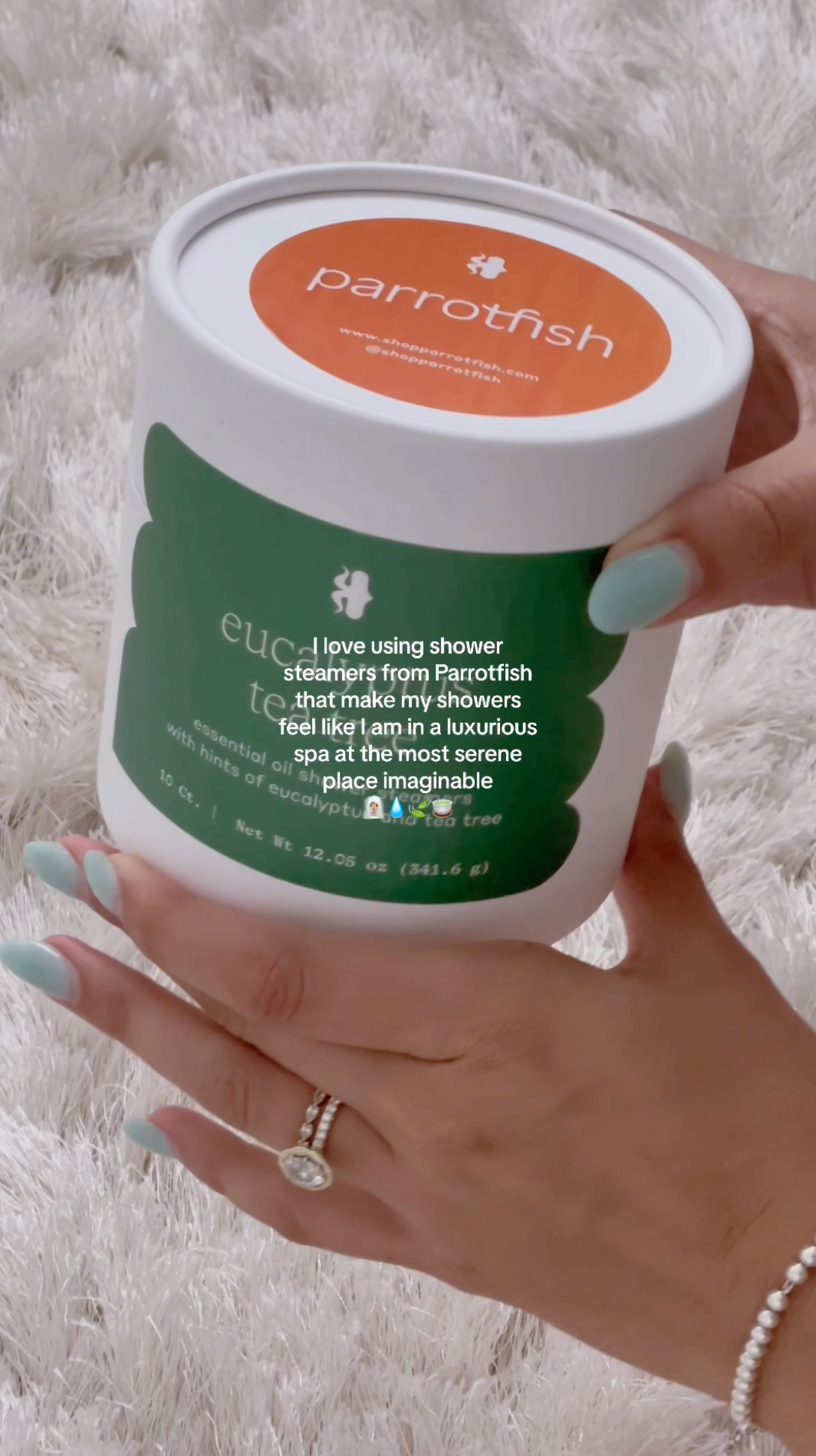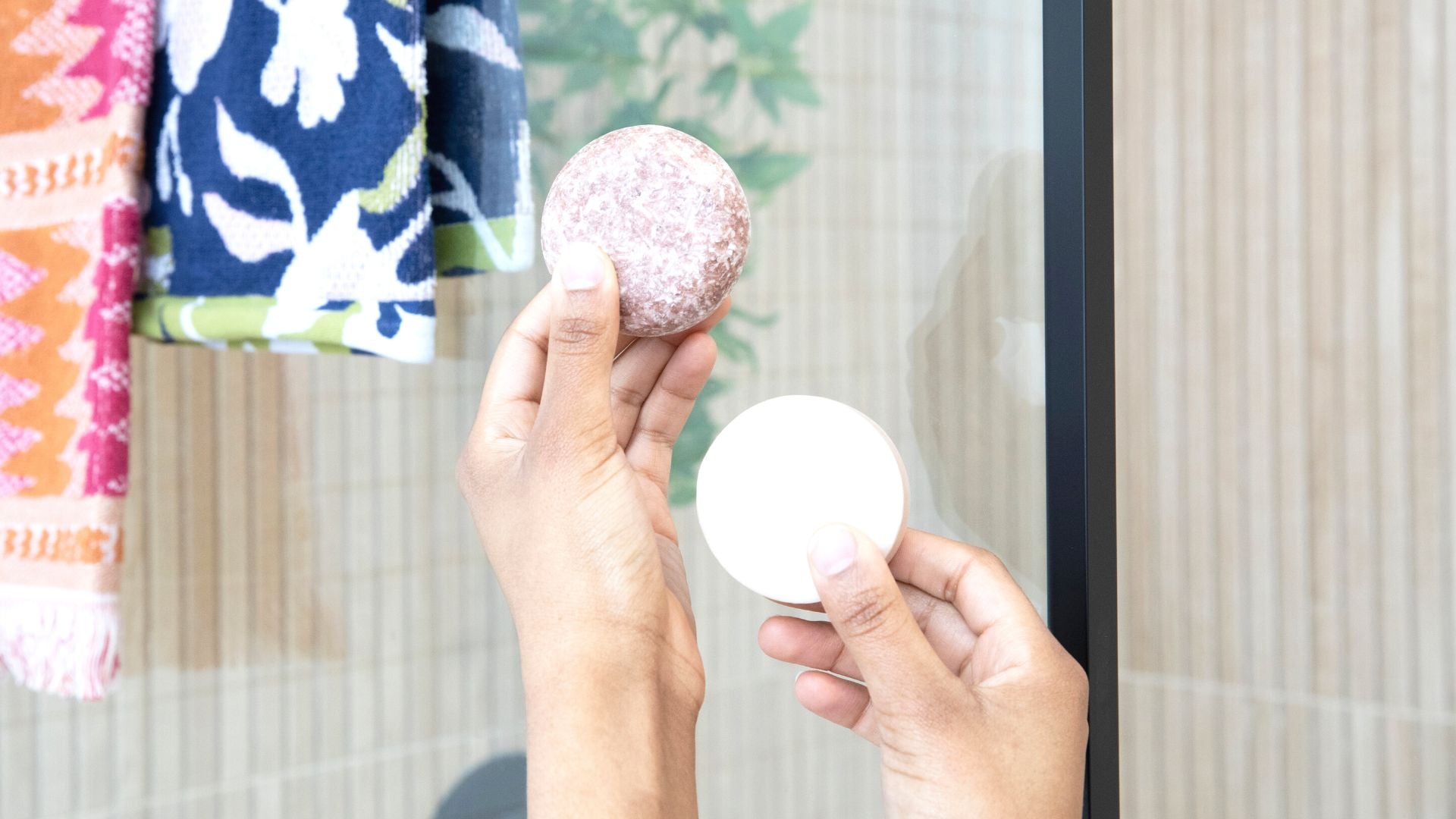

Safe-Synthetic vs. All-Natural Shampoo Bars
When you enter the world of shampoo bars, it might be hard for you to make your decision on your first shampoo bar.
Parrotfish sells safe synthetic shampoo bars to help make people's transition to a plastic-free personal care routine a little easier.
Safe-Synthetic Shampoo Bars
If you love suds, check out our argan oil shampoo bar. This bar is the closest to commercial shampoo you can currently purchase at the store. Minimal transition is needed to switch from the liquid stuff to this mighty bar. Just lather it in your hands and then run them through your hair. It's that easy!
Sulfates are the primary cleaning agent known to make your shampoo foamy and remove dirt and dead skin cells from your skin and scalp. But sulfates must be balanced, as they play a vital role in removing dirt and dead skin cells while producing a sudsy lather. Our shampoo bars are created with the safe synthetic ingredient, Sodium Coco Sulfate, a mix of fatty acids found in coconut oil and lauric acid (a naturally occurring substance from coconut milk and palm kernel oil). It is milder thanAmmonium Lauryl Sulfate, Sodium Laureth Sulfate, or Sodium Lauryl Sulfate because it is derived from coconuts, not petroleum. It also still produces a rich, foamy lather that we are all accustomed to. SCS has a natural balance of fatty acids that your hair and scalp desire. We also enrich our shampoo bars with other natural oils for your hair's optimal rich acid profile. Your hair is getting the best of both worlds because it effectively dissolves dirt and grease but in a gentler and more mild fashion. This makes the transition period from liquid to bar seamless.
Related Products
A synthetic ingredient does not speak to the quality or safety of an ingredient; it just means something that is not found and harvested directly from nature. Most importantly, not all synthetics are harmful, just as not all things labeled organic are innately good. A synthetic can be healthy, vegan, pure, non-toxic, and cruelty-free. The ingredients in our shampoo bar are high-quality and pass rigid Whole Foods Markets standards. They are also vegan and cruelty-free. The manufacturing company we chose to create our products has an in-house aesthetician and a doctorate of science that verify that the products they produce meet their manufacturing guidelines. Additionally, Working Group's (EWG) certification for surfactants, Sodium Coco Sulfate, is rated a "1," the highest safety rating.
All-Natural Shampoo Bars
For those that want all-natural shampoo bars, such as our rosemary apple cider bar, these might take a bit of adjusting. Most people will have an adjustment period with their first use, ranging from a few days to weeks or even months. This adjustment is because your hair is accustomed to commercial shampoos stripping the oils. Because all-natural shampoos keep all those oils intact, it creates a build-up and leaves your scalp in a state of shock. This build-up will make your hair feel greasy and heavy. These formulas also tend to be thinner and more difficult to distribute throughout the hair because they do not foam up. Many all-natural shampoos even emphasize that you should wash your hair twice within one shower to cover all of your hair effectively. However, washing your hair twice will reduce your bar's longevity and waste more water. We don't want to deter anyone who wants to cut plastic from their routine with a shampoo that could take over a month to transition to, so we decided to use a safe-synthetic alternative.
Commercial Shampoos
The most common ingredients in commercial shampoos are harsh chemicals such as Ammonium Lauryl Sulfate, Sodium Laureth Sulfate, or Sodium Lauryl Sulfate due to their effectiveness in stripping and removing oils. We do not sell shampoo with any of these ingredients. Additionally, high concentrations of SLS are commonly found in floor cleaners and detergents. Because SLS is a lower price, it has found its way into 98% of shampoos so companies can save money. Stripping your scalp of its natural oils causes your scalp to produce extra oil to compensate – thus creating a dependency on the chemicals.
Special Offer Just for You!
Thanks for reading our blog! As a token of appreciation, enjoy 10% off your next purchase with code BLOG10.
Curious about how our products work in real life? Check out what our customers are saying about their favorite shampoo bars and soap collections. Join the Parrotfish family and see why they love us!
Let customers speak for us
from 224 reviewsUnlike bottle dog shampoo. This lathers up so easily and my puppy smells wonderful!
I am not a fan of most bar type shampoos or conditioners, but this one works really well on my hair. Good lather and good scent. Also keeps my hair conditioned well.
Love! Was complimented on how great my gray hair looked after 1 use! Thank you definitely will buy again! No plastic to recycle and the beautiful bars dont clutter the bathtub. A huge plus for the environment and me a neat freak!
I was surprised how easy it lathers . Love the smell and use to remove yellow tones in my hair. Highly recommend
This is my first Parrotfish order and I am sold! The shampoo has a rich lather and cleans my hair so well, the conditioner leaves my hair shiny and soft, and the soaps smell SO goody and leave me squeaky clean. I was sent an extra bar of soap as a bonus - thank you!!! I love how good these smell, how effective they are, and that they don't use any plastic packaging!
Elevates your shower game. Perfect tool to help unwind after a stressful day at work or a chaotic one with the kids. 10/10
Smells wonderful and leaves my buzz cut and scalp clean.
I already love the shampoo and conditioner bars, but this bundle just made it easy to get everything i need for whole body! Love that i dont have to deal with bottles and everything smells so good
I recently tried the new ParrotFish dog shampoo, and I am beyond impressed! Not only does it leave my dog’s coat incredibly soft and shiny, but the scent is absolutely fantastic—fresh, clean, and long-lasting without being overpowering. Bath time has gone from a chore to a treat! It lathers well, rinses easily, and my dog’s skin seems much calmer and less itchy since switching. You can tell it’s made with quality ingredients. Highly recommend for anyone looking to upgrade their dog grooming routine. ParrotFish nailed it with this one!
Gotta tell you this is one of those rare delights of life that continue to give you the little joy in small things.
Now I know you're probably thinking it's a but pricey but it lasts for months and it gives you that squeaky- clean feel with your hands through your hair as you use it, so you know it's top-notch and getting the job done right, unlike some of those greasy petroleum/chemical like fake goop from a mass market thing.
I'm definitely not picky at all about these things usually, except this is one of the true gems that give you a little spark that you've found something special. You won't go back.
And it's compact - no bulky bottles, no plastic, perfect for a workout bag and use at home or on that shower shelf. And the company is top-notch, A+++ customer service and you can just tell they are good people with the occasional handwritten note in your delivery.
Can't say enough and won't use mass market crud again.
P.S. It's all about the Peppermint shampoo for me.
I love this shampoo bar. It lathers and smells so good.
This soap is so delightful. The fragrance is fresh, light and energizing.
This shampoo and conditioner set is top notch! My hair feels the best it ever has and it looks amazing!
I initially found the Parrotfish Argan Oil Conditioner Bar at an Erewhon store and decided to try it. It has transformed my hair from dry, frizzy and wavy to soft, shiny, and bouncy. It brought back my hair large loose curls. I looked up Parrotfish online and decided to buy my second one direct. Fulfillment was quick and shipping too. 😊
I immediately fell in love with this shampoo. I’ve always had oily hair but could never find shampoo that would actually help. My hair has never felt so clean with the peppermint shampoo!! I briefly tried to use other peppermint shampoo bars for convenience rather than shopping online but none of them are as good. I will never use another shampoo again!!

